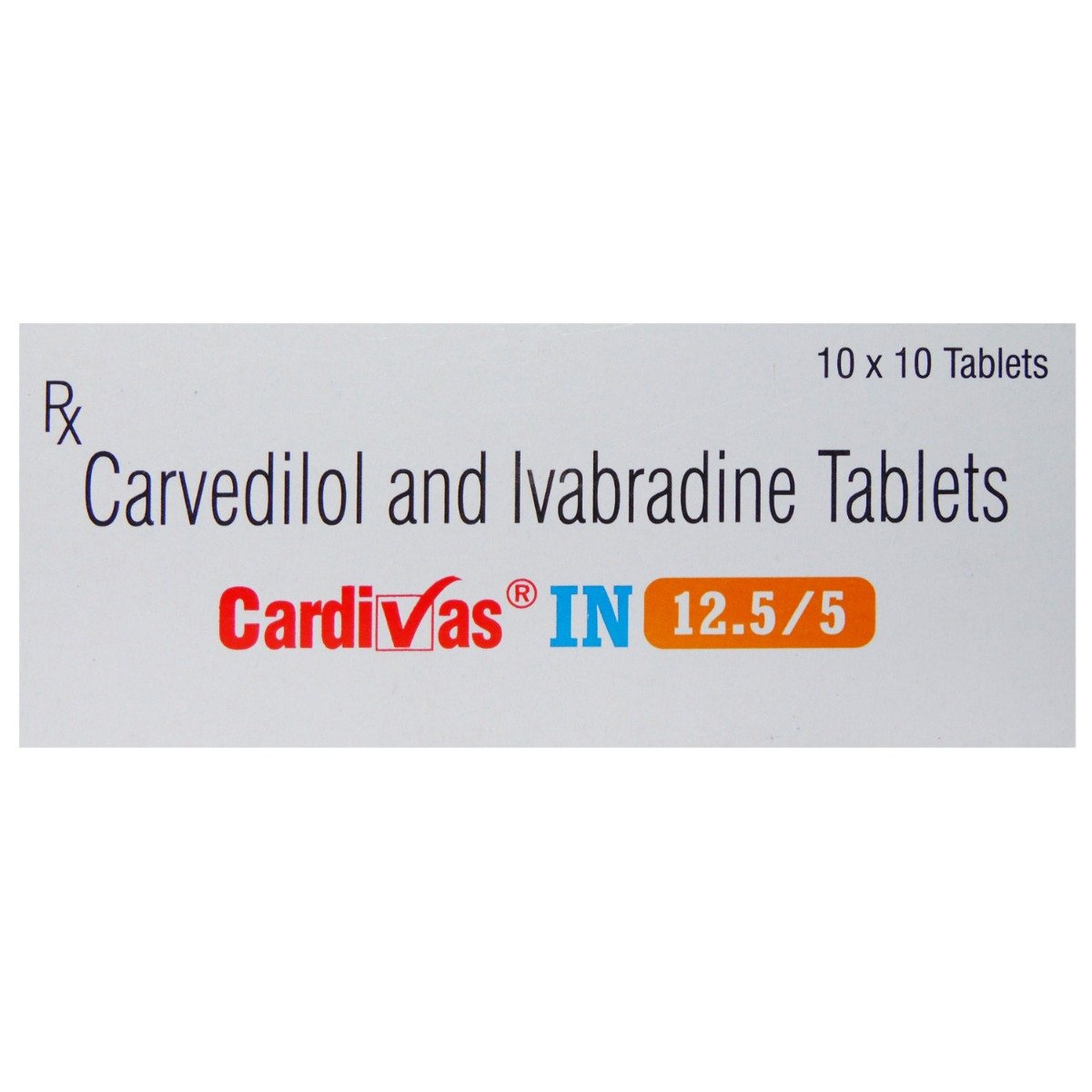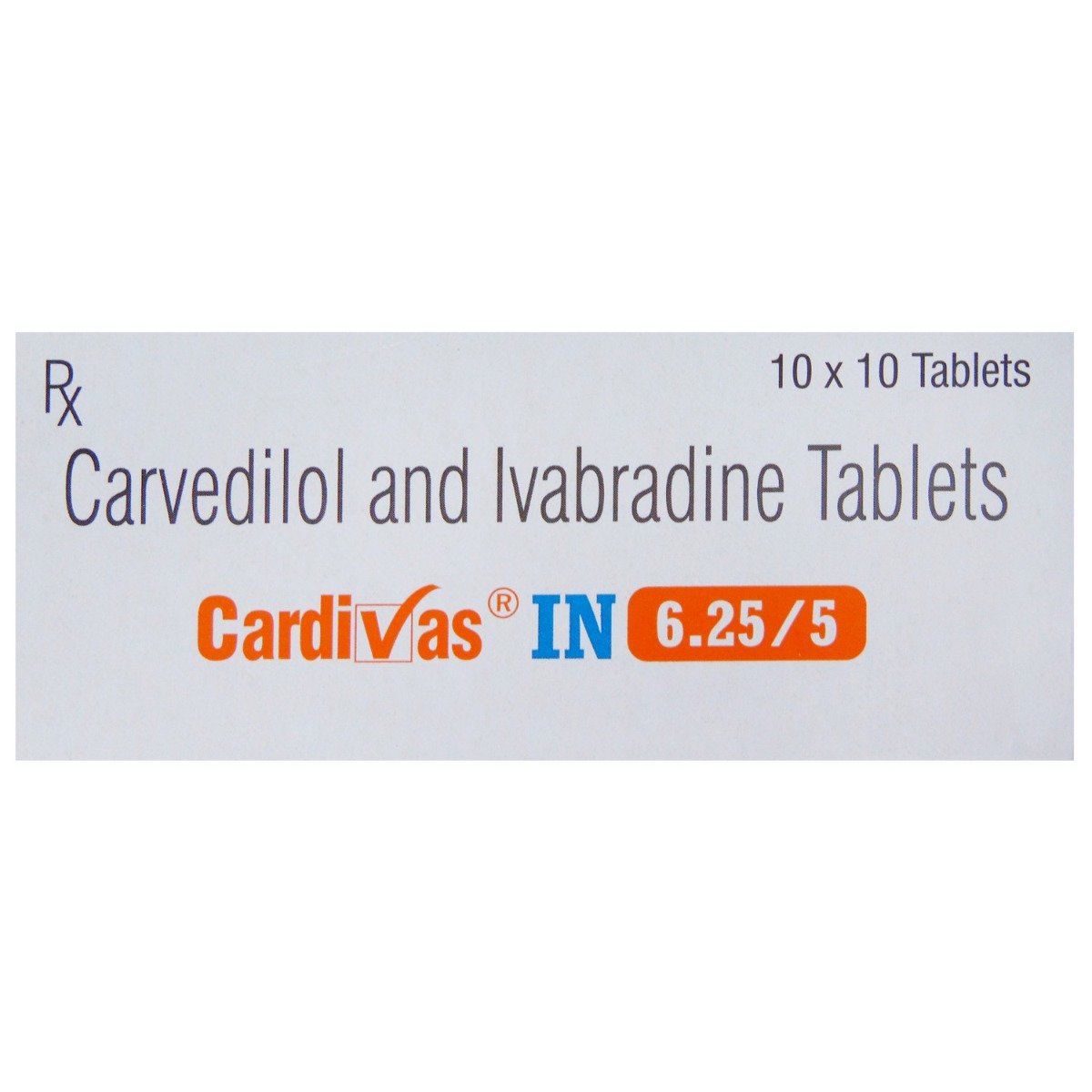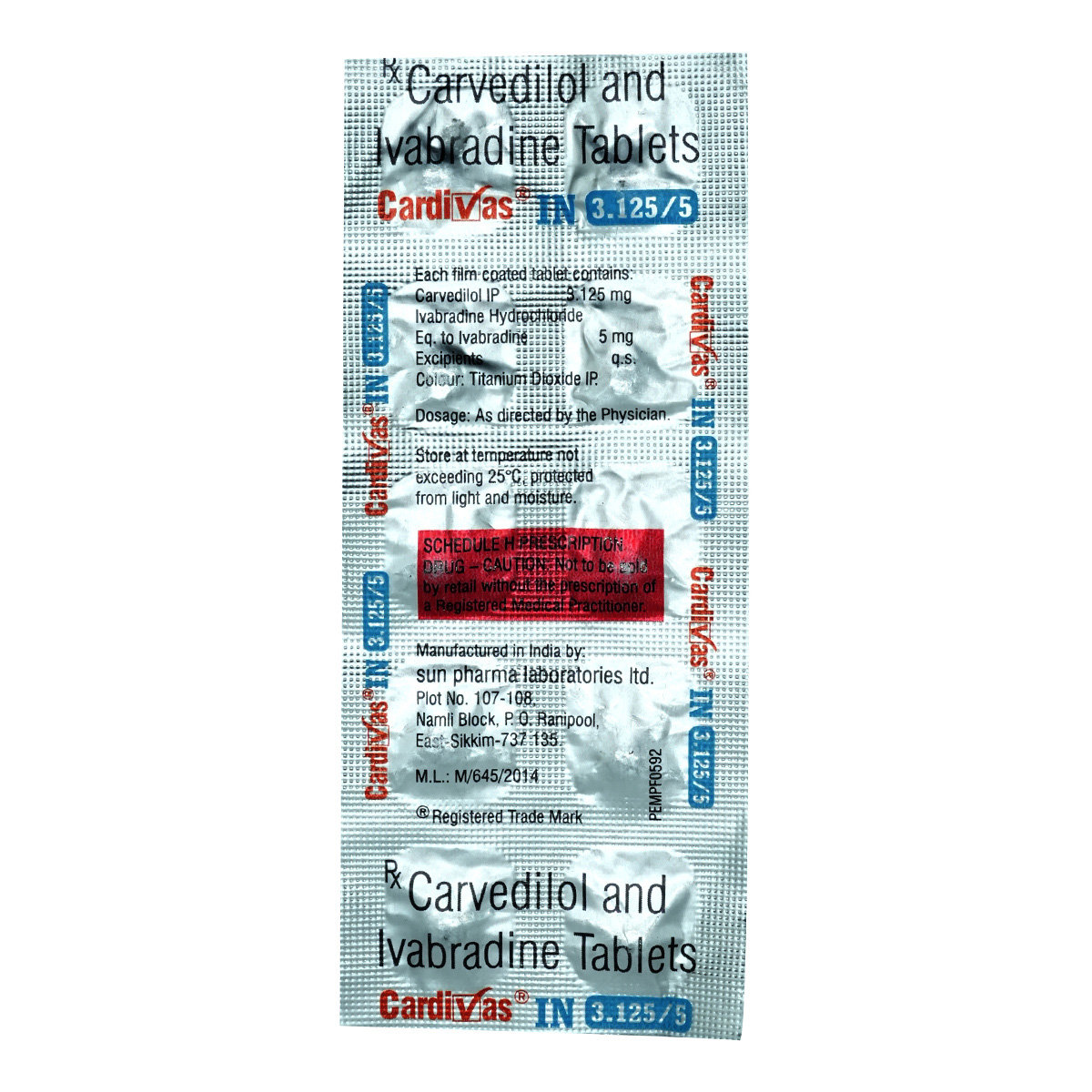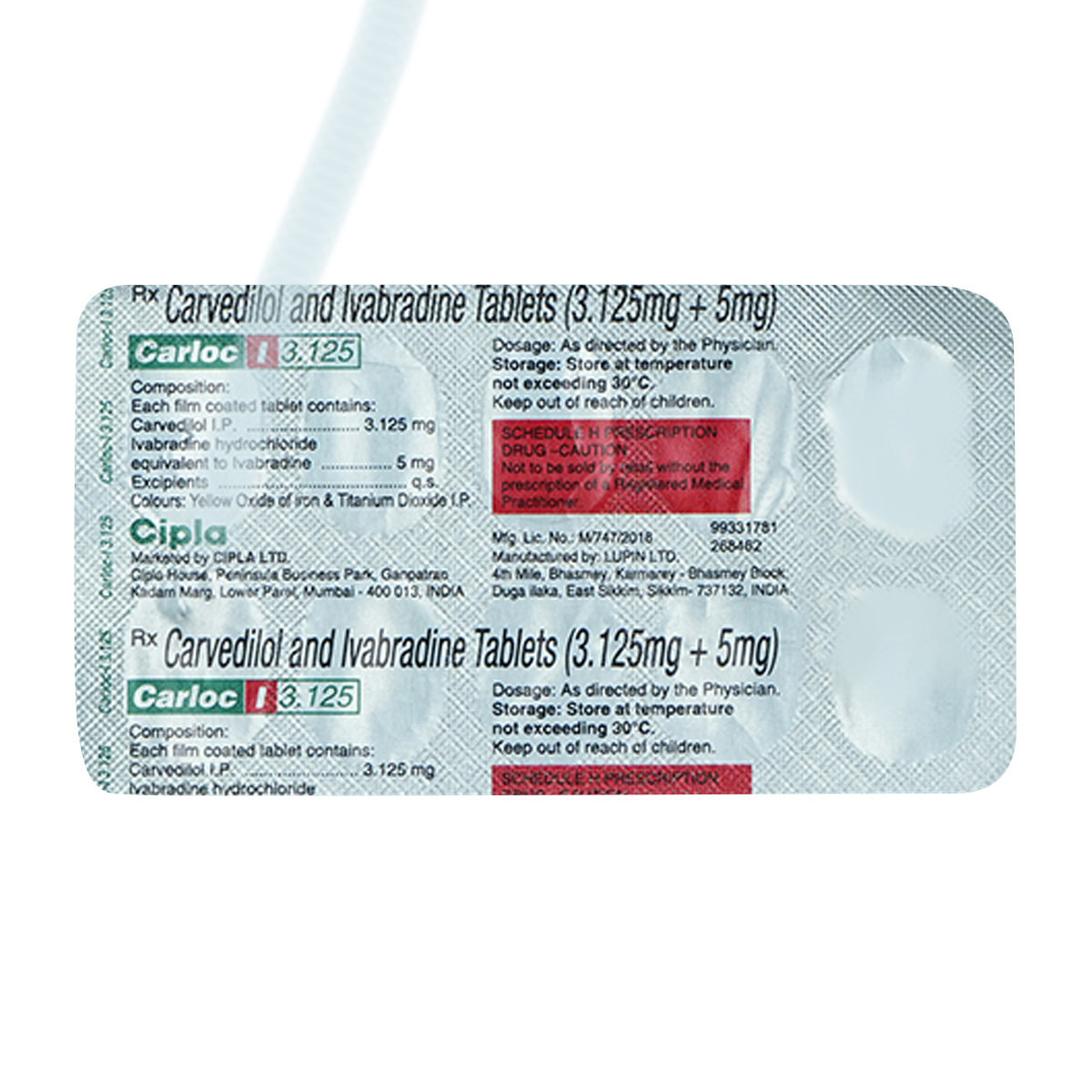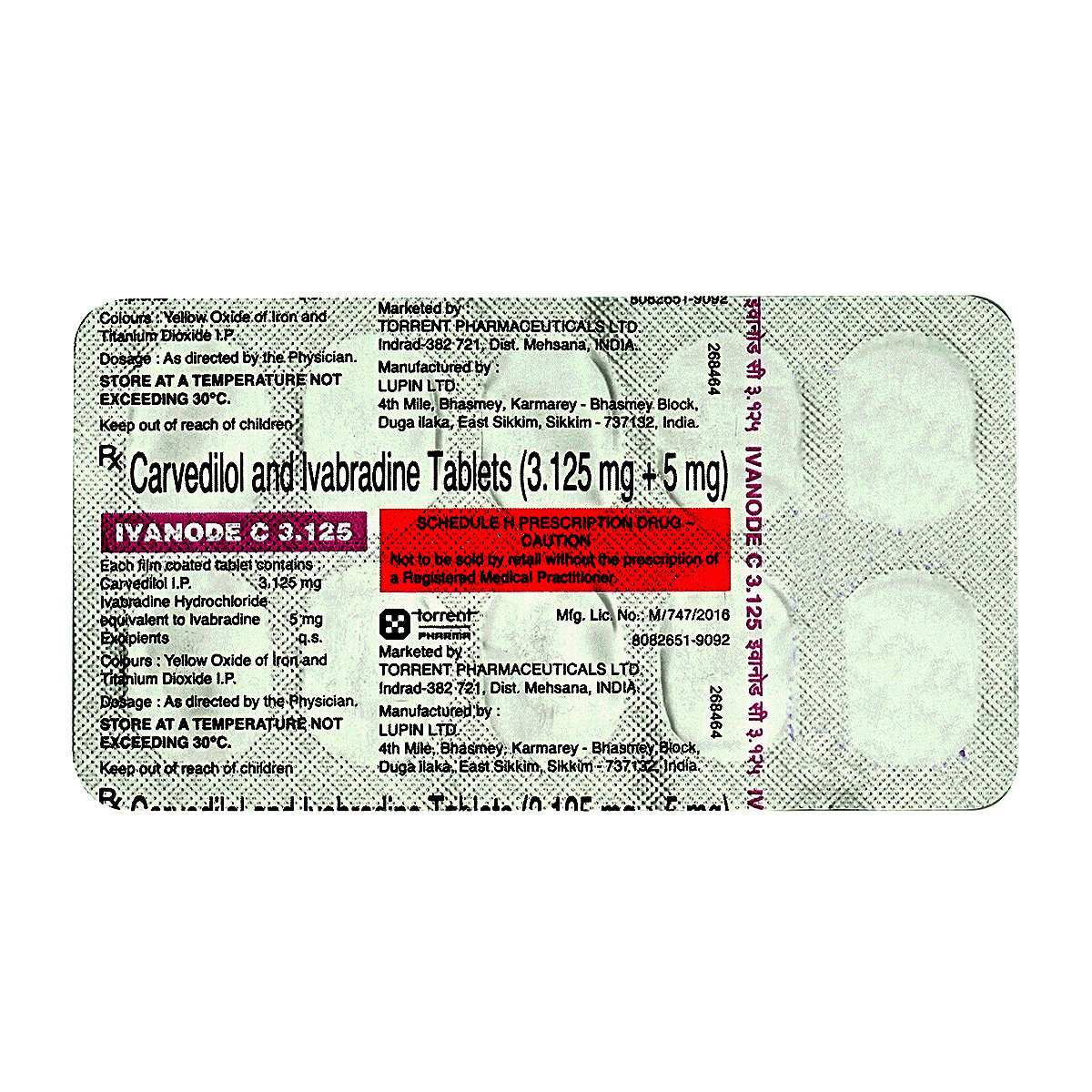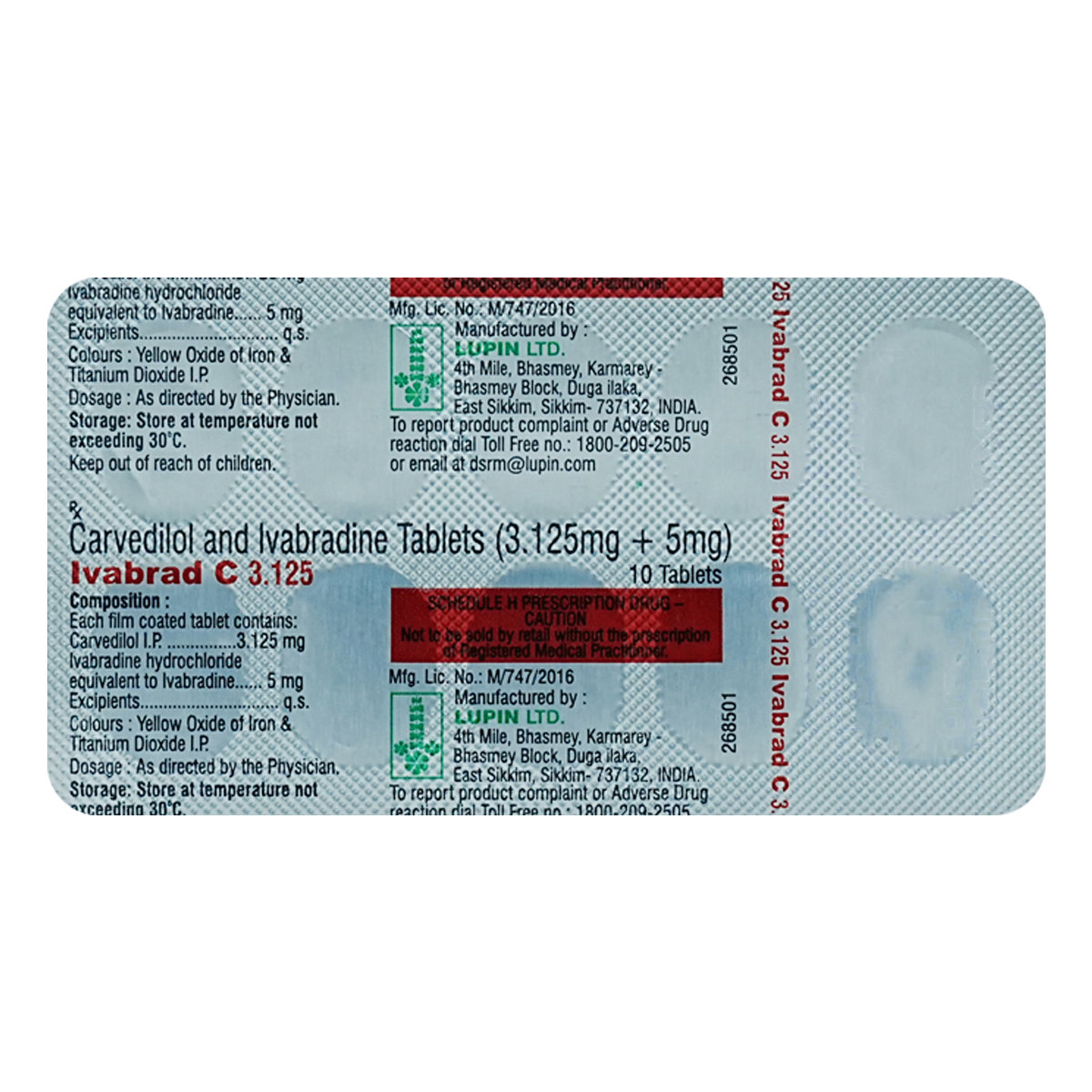Carvedilol+ivabradine
About Carvedilol+ivabradine
Carvedilol+ivabradine belongs to a group of antihypertensive medicines used to treat hypertension (high blood pressure). It is also effective in treating moderate to severe heart failure and angina (heart-related chest pain), thereby reducing the risk of heart attack or stroke in adults. High blood pressure is a condition in which the force of blood against the artery walls is very high. It will be an addition to the workload of the heart and arteries. If it continues for a long time, the heart and arteries may not function properly and damage the heart, brain, and kidneys' blood vessels, resulting in heart failure, stroke, or kidney failure.
Carvedilol+ivabradine contains Carvedilol and Ivabradine combination. Carvedilol acts by relaxing blood vessels by blocking the action of certain natural substances like epinephrine or adrenaline. Ivabradine works by reducing the heart rate by a few beats per minute. In this way, it lowers the heart's requirement for oxygen, especially in situations where an angina attack can happen. Thus, it lowers the raised blood pressure and keeps the heartbeat slowly reducing with less force, reducing the risk of having a stroke, a heart attack, or other heart problems.
Carvedilol+ivabradine should be taken as prescribed. The dose of the medicine will be decided by your doctor based on your medical condition. In some cases, Carvedilol+ivabradine may cause certain side effects such as diarrhoea, headache, weight gain, slow heartbeat, dry eyes, tiredness, dizziness, or low blood pressure. Most of these side effects do not require medical attention and gradually resolve over time. However, if the side effects persist, please consult your doctor.
Carvedilol+ivabradine should be avoided if allergic to it. If you are pregnant or breastfeeding, please inform your doctor before taking this medicine. Avoid taking Carvedilol+ivabradine if you have bronchitis, asthma, emphysema (a lung condition causing shortness of breath), severe liver disease, heart block, slow heart rate, or sick sinus syndrome (abnormal heart rhythms caused by malfunction of the heart’s natural pacemaker). Carvedilol+ivabradine is not recommended for children below 18 years of age. Inform your doctor if you have diabetes, coronary artery disease, fluid retention, thyroid disorder, angina (chest pain), kidney disease, slow heartbeats, Raynaud’s syndrome (a circulatory problem), or pheochromocytoma (tumor in the adrenal glands), or undergoing any surgery.
Uses of Carvedilol+ivabradine
Medicinal Benefits
Carvedilol+ivabradine contains Carvedilol in the controlled release form and Ivabradine. Carvedilol plays a vital role in relaxing blood vessels by blocking the action of certain natural substances in your body. Thus, it lowers blood pressure and reduces the risk of having a stroke, a heart attack or other heart problems. Ivabradine works by reducing the heart rate by a few beats per minute. In this way, it lowers the heart's requirement for oxygen, especially in situations where an angina attack can happen.
Directions for Use
Storage
Side Effects of Carvedilol+ivabradine
- Diarrhoea
- Headache
- Weight gain
- Slow heartbeat
- Dry eyes
- Tiredness
- Dizziness
- Low blood pressure
Drug Warnings
If you are allergic to Carvedilol+ivabradine or any other medicines, please tell your doctor. Carvedilol+ivabradine is not recommended for children below 18 years of age. If you are pregnant or breastfeeding, please inform your doctor before taking Carvedilol+ivabradine. If you are about to undergo any surgery, you are advised to inform your doctor that you are taking Carvedilol+ivabradine. Avoid taking Carvedilol+ivabradine if you have bronchitis, asthma, emphysema (a lung condition causing shortness of breath), severe liver disease, heart block, slow heart rate, or sick sinus syndrome (abnormal heart rhythms caused by malfunction of the heart’s natural pacemaker). If you have diabetes, coronary artery disease, fluid retention, thyroid disorder, angina (chest pain), kidney disease, slow heartbeats, Raynaud’s syndrome (a circulatory problem), or pheochromocytoma (tumor in the adrenal glands), inform your doctor before taking Carvedilol+ivabradine.
Drug Interactions
Drug-Drug Interactions: Carvedilol+ivabradine may have interaction with pain killers (aspirin), calcium channel blockers (amlodipine), water pills (furosemide, hydrochlorothiazide), and thyroid medicines (levothyroxine).
Drug-Food Interactions: Carvedilol+ivabradine may interact with grapefruit juice. Therefore, avoid intake of grapefruit juice with Carvedilol+ivabradine as it may increase the levels of Carvedilol+ivabradine in the blood. Also, avoid sodium, potassium, magnesium, and calcium-rich foods with Carvedilol+ivabradine as they may reduce the effect of Carvedilol+ivabradine.
Drug-Disease Interactions: Avoid taking Carvedilol+ivabradine if you have bronchitis, asthma, emphysema (a lung condition causing shortness of breath), severe liver disease, heart block, slow heart rate, or sick sinus syndrome (abnormal heart rhythms caused by malfunction of heart’s natural pacemaker). If you have diabetes, coronary artery disease, fluid retention, thyroid disorder, angina (chest pain), kidney disease, slow heartbeats, Raynaud’s syndrome (a circulatory problem), or pheochromocytoma (tumor in the adrenal glands), inform your doctor before taking Carvedilol+ivabradine.
Drug-Drug Interactions Checker List:
Safety Advice

Alcohol
unsafeAvoid consumption of alcohol with Carvedilol+ivabradine as it may increase the risk of low blood pressure and cause adverse effects such as dizziness, fainting, light-headedness or headache.

Pregnancy
cautionIf you are pregnant or planning pregnancy, inform your doctor before taking Carvedilol+ivabradine. Your doctor may prescribe this medicine if the benefits outweigh the risks.

Breast Feeding
unsafeCarvedilol+ivabradine is not recommended for use in breastfeeding as it may pass into breast milk and harm your infant. Hence, if you are breastfeeding, inform your doctor before taking Carvedilol+ivabradine. Your doctor may suggest you to stop feeding while on treatment with this medicine.

Driving
unsafeCarvedilol+ivabradine may cause dizziness or tiredness in some people. Therefore, avoid driving if you feel dizzy or tired after taking Carvedilol+ivabradine.

Liver
cautionIf you have a pre-existing or a history of liver disease, inform your doctor before taking Carvedilol+ivabradine. Your doctor may adjust the dose of this medicine or prescribe a suitable alternative based on your condition.

Kidney
cautionIf you have a pre-existing or a history of kidney disease, inform your doctor before taking Carvedilol+ivabradine. Your doctor may adjust the dose of this medicine or prescribe a suitable alternative based on your condition.

Children
unsafeCarvedilol+ivabradine is not recommended for use in children and adolescents below 18 years as the safety and effectiveness are not established.
Habit Forming
Diet & Lifestyle Advise
- Maintain a low salt diet and minimize eating processed foods as they contain more sodium. Try to replace salt with spices or herbs to add flavor to the food.
- Do regular exercise such as cycling, walking, jogging, dancing, or swimming for a minimum of 30 minutes per day.
- Chronic stress may also cause high blood pressure. Therefore, avoid stress by changing your expectations and the way you react in certain situations, and do activities that you enjoy by making time for yourself.
- Maintain a diet that is rich in fruits, vegetables, whole grains, and low-fat dairy products.
- Try to include heart-healthy omega-3 fatty acid-containing foods in your daily diet. You can also use low-fat cooking oil like olive oil, soybean oil, canola oil, and coconut oil, which may help in lowering high blood pressure.
- Quit smoking and avoid the consumption of alcohol.
Special Advise
- Monitor your blood pressure regularly, and if you notice any fluctuations, please consult a doctor.
- A low salt diet and regular exercise are recommended along with Carvedilol+ivabradine for effective results.
Patients Concern
Disease/Condition Glossary
Hypertension: Blood pressure is the measurement of the force that the heart uses to pump blood to all parts of the body. Hypertension is a chronic condition in which blood pressure is too high. This condition can lead to hardened arteries (blood vessels), decreasing the blood and oxygen flow to the heart. Raised blood pressure can cause chest pain (angina) and heart attack (when the blood supply to the heart is blocked). Additionally, high blood pressure also causes brain damage (stroke) and kidney failure. High blood pressure can be diagnosed with the help of a blood pressure monitor or sphygmomanometer. Systolic pressure is the pressure when the heart pumps blood out. On the other hand, diastolic pressure is the pressure when your heart is at the resting stage between heartbeats. If your blood pressure is 140/90 mm of Hg, it means the systolic pressure is 140 mm of Hg, and diastolic pressure is 90 mm of Hg. Normal blood pressure lies between 90/60 mm of Hg and 120/80 mm of Hg. If the blood pressure is 140/90 mmHg or greater, it is considered high blood pressure.
FAQs
Carvedilol+ivabradine contains Carvedilol and Ivabradine combination. Carvedilol acts by relaxing blood vessels by blocking the action of certain natural substances like epinephrine or adrenaline. Ivabradine works by reducing the heart rate by a few beats per minute. In this way, it lowers the heart's requirement for oxygen, especially in situations where an angina attack can happen.
You are recommended to avoid sodium, potassium, magnesium and calcium-rich foods with Carvedilol+ivabradine as they may reduce the effect of Carvedilol+ivabradine. Also, avoid intake of grapefruit juice with Carvedilol+ivabradine as it may increase the levels of Carvedilol+ivabradine in the blood and cause adverse effects.
Do not take more than the prescribed dose of Carvedilol+ivabradine as it may cause Carvedilol+ivabradine overdose resulting in symptoms such as dizziness, fits, fainting, weakness, bluish-coloured fingernails, uneven heartbeats and shortness of breath. However, if you experience any of these symptoms while taking Carvedilol+ivabradine, please consult a doctor immediately.

